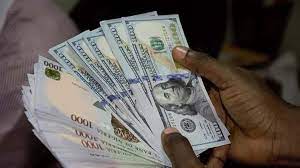The naira began the new trading week with mixed sentiments across Nigeria’s foreign exchange markets, reflecting lingering volatility and evolving policy impacts.
While the official exchange rate showed marginal depreciation, the naira recorded gains in the parallel market, buoyed by improved dollar liquidity and reduced import pressure.
According to data published on the Central Bank of Nigeria (CBN) website, the naira closed at N1,532/$1 in the official market on Friday, slightly down from N1,531/$1 on Thursday, indicating a mild depreciation.
The currency had started the week at N1,529.5/$1 on Monday, weakened to N1,530/$1 on Tuesday, appreciated slightly to N1,520/$1 on Wednesday, before losing momentum again by week’s end.
Week-on-week, the official market showed a slight weakening, with the naira slipping from N1,528.5/$1 the previous week to N1,532/$1.
According to market surveillance, the naira closed at N1,550/$1 on Friday, improving from N1,555/$1 on Thursday, and better still compared to the previous week’s closing of N1,580/$1. From Monday to Wednesday, the rate had remained relatively stable at N1,560/$1.
Dr. Nasir Aminu, a Senior Lecturer in Economics and Finance and a Senior Fellow of Advanced Higher Education at Cardiff Metropolitan University, explained the broader macroeconomic trend influencing Nigeria’s currency.
“The naira hasn’t been volatile in the last few months. And there’s a reason behind that—America’s dollar has been shrinking. It shrunk by about 15 per cent this year. That tells you a lot about the underlying strength of the naira,” he noted.
In addition to global trends, analysts and insiders point to a decline in demand for the dollar and a notable surge in liquidity within Nigeria’s financial system. Multiple sources within top-tier banks confirmed that customers are finding it easier to access foreign currency.
This dollar surplus may be partly driven by a shift in consumption patterns, as more businesses pivot toward sourcing local inputs instead of importing goods—reducing the need for foreign exchange.
CBN data also indicates that Nigeria’s external reserves grew during the week, moving from $37.127 billion on Monday to $37.3 billion on Wednesday.
The steady increase in reserves is seen as a positive signal of stronger macroeconomic fundamentals and could offer support to the naira in the weeks ahead.
With reserves trending upward, liquidity improving, and structural reforms underway, analysts say the naira may experience continued relative stability in the coming weeks—though risks remain due to Nigeria’s import dependence and external economic shocks.
The mixed performance at the start of the week reflects both resilience and caution as markets digest regulatory signals and global monetary shifts.
